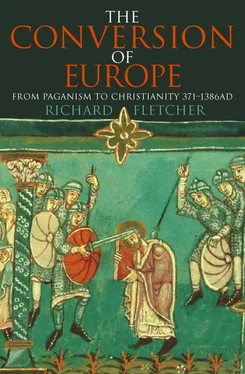The opening up of gaps or fissures in the surface of late Roman imperial rule was perhaps the most telling symptom of the empire’s inability to cope with its traditional responsibilities. Bishops filled the gaps. Episcopal wealth became significant here. Some bishoprics – but no means all – became very rich indeed. The case of Tours is, again, instructive. Gregory of Tours chronicles a succession of legacies bestowed upon the see of Tours during the course of the fifth and sixth centuries. Legacies often came from the bishops themselves. Bishop Remigius (Rémi) of Rheims left his substantial fortune to the see of Rheims and Bishop Bertram of Le Mans left an even more substantial fortune to the see of Le Mans. Wealth brought local responsibilities and opportunities as well as temptations. All the diverse services which today we would classify under the heading of ‘welfare’ came to be the responsibility of bishops – poor relief, public works, education, health care, hospitality for travellers, prison visiting, ransoming of captives, the provision of public entertainments and spectacles. They even included, in one case that we know of, banking: Bishop Masona of Mérida, in southern Spain, established a bank in about 580 for making loans to the public. These day-to-day responsibilities gave the bishop authority and power, a position of leadership in the community. In addition, of course, and above all else, the bishop possessed spiritual power: control over the administration of the sacraments of salvation, leadership in the intercessory activity of prayer and rogation, power to bind with the threat of excommunication, access to divine medicine of exorcism and healing, opportunity to sanction, encourage and organize the cult of saints and their relics.
This upward drift in the public profile of the bishop and his evermultiplying staff was a matter for the attention not just of the citizenry within the walls of the cathedral city but also of the dwellers in the rural hinterland. If official Christianity was, increasingly with the passing years, what gave cohesion and identity to a community there was some inducement to throw in your lot with it. Rural conversion, like many other varieties of conversion to Christianity (or other faiths), partook of something of the nature of joining a club.
We must make allowance too for the steady reiteration by bishops of the kind of preaching that we have already met in the homilies of Maximus of Turin. Bishops hammered away at the same old themes throughout the fifth and sixth centuries. Here, by way of example, is Caesarius, bishop of Arles from c. 500 to 543.
We have heard that some of you make vows to trees, pray to fountains, and practice diabolical augury. Because of this there is such sorrow in our hearts that we cannot receive any consolation. What is worse, there are some unfortunate and miserable people who not only are unwilling to destroy the shrines of the pagans but even are not afraid or ashamed to build up those which have been destroyed. Moreover, if anyone with a thought of God wants to burn the wood of those shrines or to tear to pieces and destroy the diabolical altars, they become angry, rave with fury, and are excited with excessive frenzy. They even go so far as to dare to strike those who out of love for God are trying to overthrow the wicked idols; perhaps they do not even hesitate to plan their death. What are these unfortunate, miserable people doing? They are deserting the light and running to darkness; they reject God and embrace the Devil. They desert life while they follow after death; by repudiating Christ they proceed to impiety. Why then did these miserable people come to church? Why did they receive the sacrament of baptism – if afterwards they intended to return to the profanation of idols? 8
Caesarius was an accomplished preacher. His 238 surviving sermons were composed in the straightforward Latin of daily speech in southern Gaul, not the elaborate literary Latin then fashionable among intellectuals. They were short, direct and pithy, fashioned to reach and influence an everyday audience of everyday men and women throughout the diocese. To this end Caesarius had extracts from the corpus copied for circulation among the local clergy. He spared no effort to ensure that Christian standards of behaviour were proclaimed loudly and unambiguously before his flock.
The sermons of Caesarius enjoyed a wide and a long circulation. In the official Homiliary – the standard collection of sermons for regular use – of the seventh-century Spanish church, nearly half of the homilies are those of Caesarius. It is from Spain too that there survives a work which specifically addresses itself to rural mission. This is the De Correctione Rusticorum of Martin of Braga. (It is a title which is a little hard to translate. The Latin word correctio , at this date, implies reform through punishment; and while the primary meaning of rusticus is ‘countryman’, the notion of ‘rusticity’ was not just a statement about locality but had overtones about behaviour and disposition as well. On the Castigation of Country-dwellers might do.) Martin, like his great namesake, was a native of Pannonia who had received a good education and had travelled in the east. In circumstances that remain shrouded in mystery he turned up in Spain about the middle of the sixth century. By the year 572 he had become bishop of Braga, now in northern Portugal, and he died in about 580. Braga, the Roman Bracara Augusta, was the capital of its province, Gallaecia (rather more extensive to the east and south than the modern Galicia), its bishop therefore the leading churchman of the province. Martin was an ecclesiastic of rank and influence.
De Correctione Rusticorum takes the form of a letter addressed to one of Martin’s fellow bishops, Polemius of Astorga, but the writer makes it clear that it was intended for public delivery as a sermon. Martin began with a brief sketch of sacred history, firmly locating the pagan gods among the demonic ministers of the Devil when he was cast out of heaven:
The demons also persuaded men to build them temples, to place there images or statues of wicked men and to set up altars to them, on which they might pour out the blood not only of animals but even of men. Besides, many demons, expelled from heaven, also preside either in the sea or in rivers or springs or forests; men ignorant of God also worship them as gods and sacrifice to them. They call on Neptune in the sea, on Lamiae in the rivers, on Nymphs in spring, on Dianas in woods, who are all malignant demons and wicked spirits, who deceive unbelieving men, who are ignorant of the Sign of the Cross, and vex them. However, not without God’s permission do they do harm, because the rustics have angered God and do not believe with their whole heart in the faith of Christ, but are so inconstant that they apply the very names of demons to each day and speak of the days of Mars, Mercury, Jove, Venus and Saturn …
His exposition merges into a catechism, with digressions to identify various sins such as celebrating the New Year with the pagan Roman festival of the Kalends of January (that is, 1 January), and looks forward to the end of the world. He dwells on baptism as ‘a pact you made with God’ and then turns to human betrayals of that pact:
And how can any of you, who has renounced the Devil and his angels and his evil works, now return again to the worship of the Devil? For to burn candles at stones and trees and springs, and where three roads meet, what is it but the worship of the Devil? To observe divinations and auguries and the days of idols, what is it but the worship of the Devil? To observe the days of Vulcan [23 August] and the first days of each month, to adorn tables and hang up laurels, to watch the foot, to pour out fruit and wine over a log in the hearth, and to put bread in a spring, what is it but the worship of the Devil? For women to invoke Minerva in their weaving, to keep weddings for the day of Venus [Friday], to consider which day one should set out on a journey, what is it but the worship of the Devil? To mutter spells over herbs and invoke the names of demons in incantations, what is it but the worship of the Devil? And many other things which it takes too long to say. And you do all these things after renouncing the Devil, after baptism, and, returning to the worship of demons and to their evil works, you have betrayed your faith and broken the pact you made with God. You have abandoned the sign of the Cross you received in baptism, and you give heed to the signs of the Devil by little birds and sneezing and many other things. Why does no augury harm me or any other upright Christian? Because where the sign of the Cross has gone before, the sign of the Devil is nothing … 9
Читать дальше












